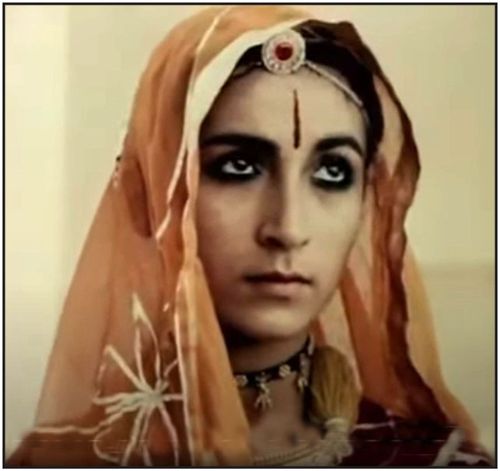Raissa Padamsee

Subscribe to read full article
This section is for paid subscribers only. Our subscription is only $37/- for one full year.
You get unlimited access to all paid section and features on the website with this subscription.
Not ready for a full subscription?
You can access this article for $2 , and have it saved to your account for one year.
- Primary Cinema: Hindi
- Parents: Solange Gounelle and Akbar Padamsee
- Spouse: Laurent Brégeat
Raissa Padamsee is known for her performance as the female protagonist in the well-known Indian auteur Mani Kaul's critically acclaimed 1973 Hindi film Duvidha. Daughter of renowned artist Akbar Padamsee and his first wife, Frenchwoman Solange Gounelle, she was apparently named by M F Husain, whose daughter is also named Raisa. For her role in the award-winning Duvidha, she did not know a word of Hindi and only spoke French in her role of the silent bride. Later, she declined to work in any more films. An art historian living in Paris, she and her husband, filmmaker Laurent Bregeat, visit Mumbai every year since several decades.
At the time of the making of Duvidha, Akbar Padamsee and Raissa’s mother had separated. Raissa Padamsee, just 16 at the time, would often travel from France to Bombay to visit her father. Many artists, photographers and filmmakers would congregate at Akbar Padamsee’s Vision Exchange workshop at his Taher Mansion apartment at Bombay’s Nepeansea Road. Mani Kaul, a disciple of her father’s, was a regular too. Akbar Padamsee himself was deeply interested in cinema, and even directed two experimental films, Syzygy and Events in a Cloud Chamber, in 1969.
Kaul, who had made his debut feature Uski Roti in 1970, followed by Ashad Ka Ek Din (1971), was looking for a female lead for Duvidha. While he zeroed in on Raissa for the role of the female protagonist as he felt she had a ‘pure and innocent look’, she refused initially being very shy at the time. Eventually, she agreed to do the film which was also partly financed by her father.
Duvidha was based on a folktale of the same name by Rajasthani writer Vijaydan Detha – the story would also inspire the Amol Palekar-directed Shah Rukh Khan-Rani Mukerji starrer Paheli (2005). Counted as one of Kaul’s “most beguiling and enduring works,” it released in 1973. It has been described as emerging “from the intersection of modernist and miniature painting and Rajasthan’s musical and literary traditions.”
The plot revolves around an act of transfiguration wherein a young bride (Raissa Padamsee) catches the eye of a tree ghost. He assumes the form of her husband (Ravi Menon), when the latter leaves home to pursue his career. The ghost impregnates the young woman in her husband’s absence. When the husband returns, the wife is forced to make a choice between the real groom and the ghost, leading to the dilemma of who is the child’s father and who is the real husband – whether the one who left behind a young bride to make more money, or the one who gave her company and love? The film develops the characters through parallel, historically uneven and even contradictory narratives.
While filming, a teenaged Raissa was given very specific directions by Kaul, to the extent that he instructed her, ‘You are the branch and I am the wind. When I blow, you move.’ The film was shot on a tight budget with a skeletal crew, leaving no room for mistakes or retakes. Even Raissa’s make-up consisted of just Lakme foundation cream.
Winning critical acclaim, Duvidha secured the National Film award for best director as well as the critics’ award for best film at the 1974 Filmfare awards. It was the winner: Interfilm award - recommendation (Forum of New Cinema) at the Berlin international film festival, and was also screened at the film festivals in Venice, Rotterdam and Chicago.
Decades later, Raissa would call it “a beautiful adventure”, admitting that she had mixed feelings about its making. Though she didn’t speak Hindi and her lines for the film were dubbed, she revealed that she felt one with her character Lacchi. “I wasn’t acting, I was that girl,” she would recount in an interview to Scroll. “It was as if I had been hypnotised. I was in a kind of trance, and if the camera was close to my face, I never even felt it.” The film is filled with images of her looking closely into the camera, the vivid hues of the dark kohl lining her eyes and the red vermillion on her forehead, leaping to attention.
Watching the film for the first time, however, she wasn’t impressed at all by her performance - “I reacted very badly at the time, I felt it wasn’t me,” she said. Even though Kaul told her she was his best actress, she believes his praise stemmed from her own submissiveness.
Re-watching Duvidha many times over, she describes it as a beautiful film that can be interpreted in many ways, and touches the viewer on many levels. Its elusive nature, she believes, is the secret of its lasting power.
Though she received several acting offers after her debut film, she turned them down as she found it unbearable! “I can’t stand it,” she bluntly stated about acting. Her presence has, nevertheless, been recorded for posterity in a film that has been likened to a tableau vivant – a ‘living picture’ that combines elements of a theatrical performance with painting and photography.
Choosing to return to Paris, she lives there with her family. Her husband Laurent Brégeat is a filmmaker.
She is the niece of well-known theatre personality and ad filmmaker, the late Alyque Padamsee, who is her paternal uncle.
References
https://asianmoviepulse.com/2021/09/film-review-duvidha-1973-by-mani-kaul/
https://scroll.in/reel/828866/film-flashback-the-ghost-in-the-tree-from-1973
https://mubi.com/films/duvidha/awards
Image courtesy: https://www.youtube.com/watch?v=MyRRl00xoc8 (14:53)
-
Filmography (1)
SortRole
-
Duvidha 1973
-







.jpg)



